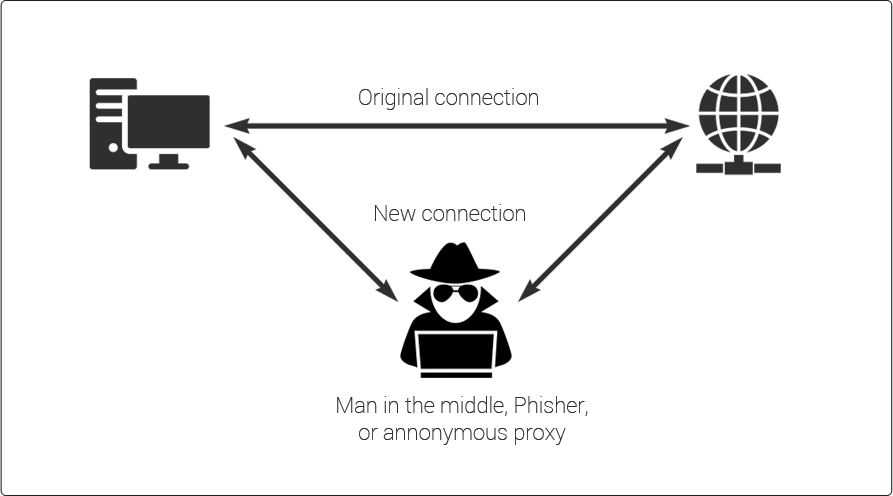ARP POISONING
Address Resolution Protocol (ARP) is a stateless protocol used to solve an IP address with a machine MAC address. All network devices that need to communicate on the network broadcast ARP queries in the system to find out other machines’ MAC addresses. ARP Poisoning is also known as ARP Spoofing.
Here is how ARP works:
When one machine needs to communicate with another, it looks up its ARP table.
the network.
to the ARP_request with its IP and MAC address.
communication will take place. to overload the switch. spoofed ARP responses, the attackers can sniff all network packets.
active attack where the adversary impersonates the user by creating a connection between
the victims and sends messages between them. In this case, the victims think that they
are communicating with each other, but in reality, the malicious actor controls the
communication.
active attack where the adversary impersonates the user by creating a connection between
the victims and sends messages between them. In this case, the victims think that they
are communicating with each other, but in reality, the malicious actor controls the
communication.
If the MAC address is not found in the table, the ARP_request is broadcasted over All machines on the network will compare this IP address to MAC address.
If one of the machines in the network identifies this address, then it will respond The requesting computer will store the address pair in its ARP table and
What is ARP Spoofing?
ARP packets can be forged to send data to the attacker’s machine.
ARP spoofing constructs a large number of forged ARP request and reply packets
The switch is set in forwarding mode and after the ARP table is flooded with Attackers flood a target computer ARP cache with forged entries, which is also known as poisoning. ARP poisoning uses Man-in-the-Middle access to poison the network.
What is MITM?
The Man-in-the-Middle attack (abbreviated MITM, MitM, MIM, MiM, MITMA) implies an
Main In Middle Attack
A third person exists to control and
monitor the traffic of communication between two parties. Some protocols such as SSL serve to prevent this type of attack.
ARP Poisoning
− Exercise
In this exercise, we have used VMware workstation to use ARP virus in the atmosphere of the land in which we have installed black linux and aircap equipment to sniff local traffic in the LAN.
For this exercise, you would need the following tools:
- VMware workstation
- Kali Linux or Linux Operating system
- Ettercap Tool
- LAN connection
Step 1:
Install the VMware workstation and install the Kali Linux operating system. Step 2:
Login into the Kali Linux using username pass “root, toor”.
Step 3: Make sure you are connected to
local LAN and check the IP address by typing the command ifconfig in the terminal.
Step 4: Open up the terminal and type
“Ettercap -G” to start the graphical version of Ettercap.
Step 5: Now click the tab “sniff” in the
menu bar and select “unified sniffing” and click OK to select the interface. We are
going to use “eth0” which means Ethernet connection.
Step
6: Now click the
“hosts” tab in the menu bar and click “scan for hosts”. It The whole network will start scanning for live hosts.
Step 7: Next, click the “hosts” tab and
select “hosts list” to see the number of hosts available in the network. This list also
includes the default gateway address. We have to be careful when we select the targets.
Step 8: Now we have to choose the targets.
In MITM, our target is the host machine, and the route will be the router address to forward the traffic. In an
MITM attack, the attacker intercepts the network and sniffs the packets. So, we
will add the victim as “target 1” and the router address as “target 2.”In VMware environment, the default
gateway will always end with “2” because “1” is assigned to the physical machine.
Step 9: In this
scenario, our target
is “192.168.121.129” and
the router is “192.168.121.2”.
So we will add target 1 as victim IP and target 2 as router IP.
Step 10: Now click on “MITM” and click “ARP
poisoning”. Thereafter, check the option “Sniff
remote connections” and click OK.
Step 11: Click “start” and select “start sniffing”. This will cause ARP toxicity in the network, which means that we have enabled our network card in "enhanced mode" and now can smell local traffic.
Note: We have allowed only HTTP sniffing
with Ettercap, so don’t expect HTTPS packets to be sniffed with this process.
Step 12: Now it’s time to see the results;
if our victim logged into some websites. You can see the results in the toolbar of Ettercap.
This is how sniffing works. You must
have understood how easy it is to get the HTTP credentials just by enabling ARP poisoning.
ARP Poisoning has the potential to
cause huge losses in company environments.This is where ethical hackers have been appointed to secure the network.
Like ARP poisoning, there are other
attacks such as MAC flooding, MAC spoofing, DNS poisoning, ICMP poisoning, etc. that can cause significant loss to
a network.
In the next chapter, we will discuss another type of attack which is known as DNS poisoning.















No comments:
Post a Comment